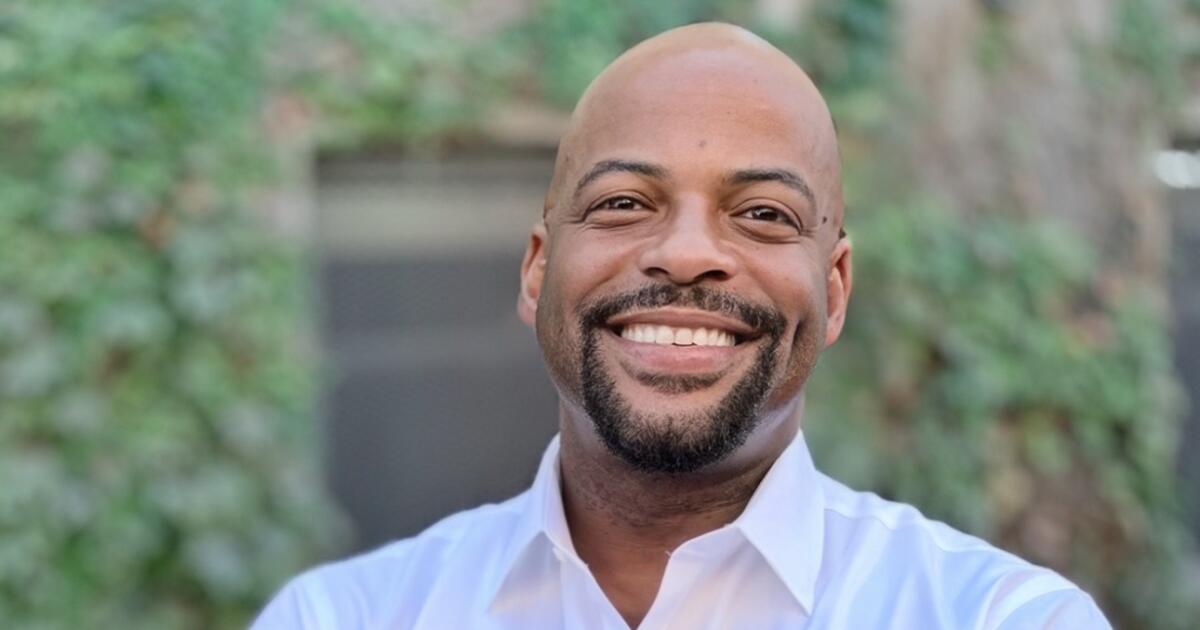Veteran L.A. County politician to challenge Kenneth Mejia for city controller
Isadore Hall, a former state legislator and Compton City Council member, launched a campaign Monday to challenge Los Angeles City Controller Kenneth Mejia.
Mejia, a young leftist who electrified the typically staid race for controller in 2022, announced his own reelection bid earlier this month.
Hall, who is backed by a slew of prominent endorsers, argues that Mejia has been more focused on “social media theatrics” than protecting tax dollars.
He said he would bring common sense leadership and accountability, citing his lengthy track record in elected office and master’s degrees in management and public administration, as well as experience weeding out government waste and fraud in Compton.
Hall, who moved to Los Angeles in 2016 and represented parts of the city in both the Assembly and the state Senate, said he launched his bid after being asked by “some elected officials,” along with several pastors and labor leaders, though he declined to provide specifics.
Hall’s endorsements include L.A. County Supervisors Janice Hahn and Kathryn Barger, L.A. City Councilmember Bob Blumenfield, California Treasurer Fiona Ma, Insurance Commissioner Ricardo Lara and five state legislators. If elected, Hall would be the city’s first Black controller; Mejia, who is Filipino American, previously made history as the first Asian American elected to citywide office in L.A.
“It’s one thing to be a great finance person or an auditor or a person who understands numbers … but you also have to have a temperament. You also have to understand the importance of governance,” Hall said, arguing that Mejia’s office is poorly managed and lacks good communication with city department heads and other local leaders.
Mejia has sought to demystify the city’s complex budget process and finances with frequent social media videos. His office has audited the Los Angeles Police Department’s use of helicopters, homeless shelter bed data and the implementation of an anti-tenant harassment ordinance, among other topics.
It’s still unclear whether other candidates will enter the race for controller — a coveted role that is one of three citywide offices, along with mayor and city attorney.
L.A. City Councilmember Monica Rodriguez has been rumored to potentially be interested in a bid for either mayor or controller, though she declined to discuss her plans with The Times last week.
Hall and Mejia represent vastly different flanks of the Democratic Party, and the coming race will almost certainly pit L.A. establishment politics against the city’s ascendant left.
Three years ago, despite being heavily outspent, Mejia made political mincemeat of Paul Koretz, who had held elected office since before he was born. Young voters who were previously unaware that L.A. even had a controller were galvanized by Mejia’s unorthodox campaign, which directed an unprecedented spotlight toward L.A.’s chief accounting officer, auditor and paymaster.
Mejia’s successful campaign coincided with a moment where faith in L.A. City Hall was at a nadir amid numerous criminal scandals and an explosive leaked recording of some City Council members frankly discussing politics in sometimes racist terms. The question in 2026 will be whether the civic pendulum has shifted and if the phrase “veteran politician” still doubles as an effective slur. Mejia will also now be running as the incumbent rather than an outsider.
Hall, 52, has spent roughly 15 years in elected office, beginning with the Compton school board in his mid-20s.
Like Mejia, who is now 34, Hall found success in politics relatively young. But his career ascended the old-fashioned way — through incrementally higher offices and with the support of the pastors, labor and community groups who have long powered the Democratic political machine in South L.A. and surrounding cities.
After losing a hard-fought bid for Congress in 2016, Hall was appointed by then-Gov. Jerry Brown to the California Agricultural and Labor Relations Board. Hall was originally seen as a shoo-in victor during his congressional campaign, but underdog challenger Nanette Barragán succeeded, in part, by hammering him on his ties to special interests in the oil, alcohol and tobacco industries, according to prior Times reporting.
Mejia first made his name with unsuccessful runs for Congress as a Green Party candidate. He found his stride and exploded as a political pied piper of sorts during the 2022 election, where his energetic TikTok videos, sharp billboards and occasional dances in a Pikachu costume helped fuel the energy of the moment.
Attempts by critics to paint Mejia in 2022 as too “extreme” because of his anti-police positions and past bombastic tweets largely fell flat.
He faced some growing pains in City Hall, including early staff turmoil within his office, but he has largely been a quieter presence than many expected.
As the race heats up, Mejia will almost certainly attack Hall for a number of controversies involving campaign finance.
During his 2014 campaign for state Senate, rivals attacked Hall for his use of campaign funds to pay for expensive dinners, limousine rentals, luxury suites at concerts and trips — expenses he defended as legitimate campaign costs.
In his 2016 congressional run, he was accused of illegally spending general election funds during the primary. A Federal Election Commission audit confirmed some misuse but took no enforcement action.
Hall said last week that he hadn’t been an expert in the complex rules of congressional campaign finance but held his accountant accountable for the error and learned from the experience.

